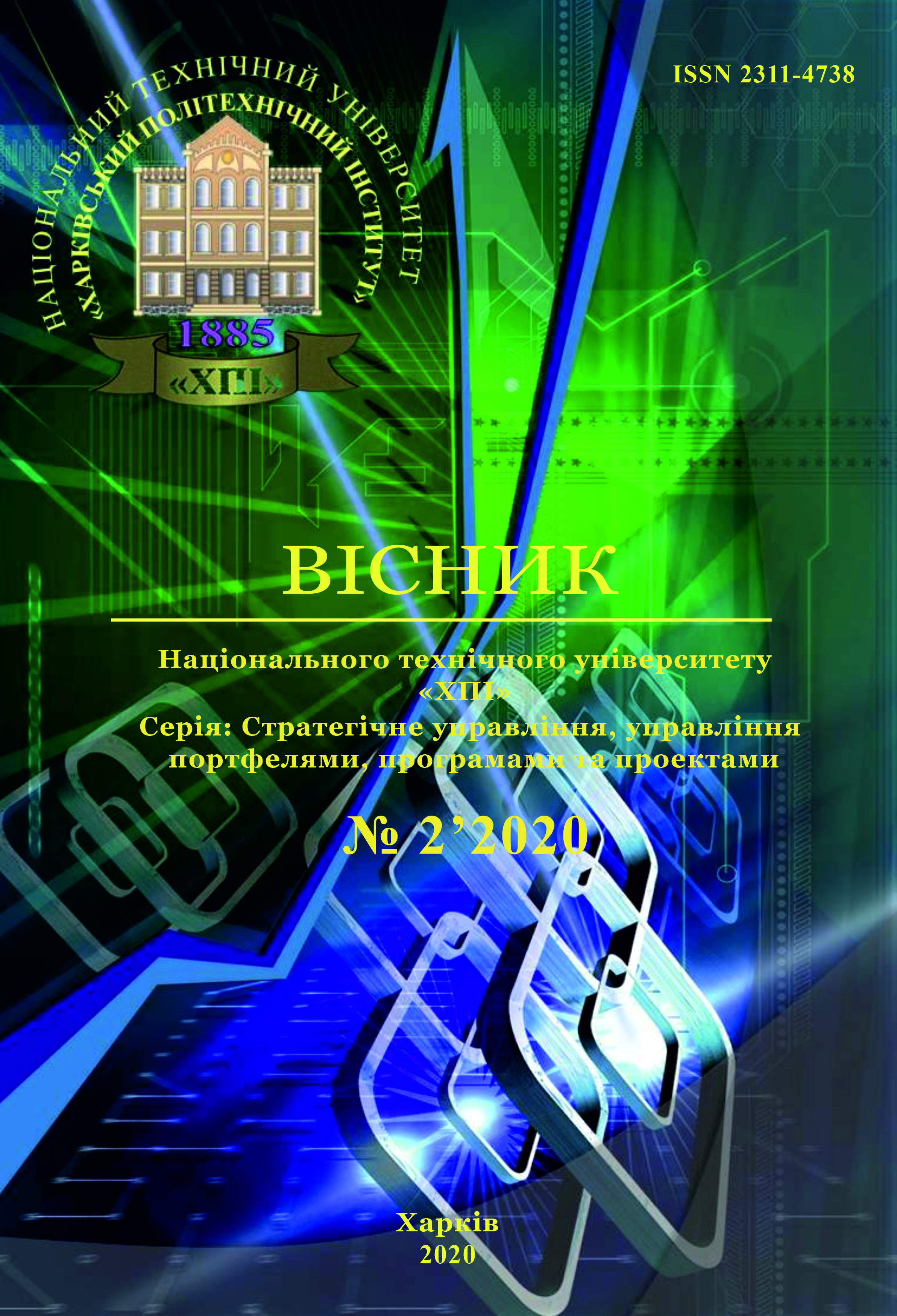TEMPORAL PROCESSES ALIGNMENT METHOD FOR COMPLICATED SYSTEMS
DOI:
https://doi.org/10.20998/2413-3000.2020.2.1Keywords:
Temporal Processes, Complicated System, Lifecycle, Costs, Optimization, Recovery, Forecast, Time SpanAbstract
The presented work researches a possibility to compose temporal processes to reduce complicated system operation expenditures. It is established, that temporal processes are classified into three categories in view of their influence on a system’s functional state. They are single (1), repeating (2) and cyclic (3). It is also established, that presence of large number of temporal processes within a system requires an individual approach to their control. Temporal processes alignment method is developed consisting of six fundamental provisions: 1) with none additional restrictions the attraction point falls within the time interval of either of temporal processes; 2) temporal processes’ shifting does not involve additional expenditures if it does not generate extra temporal process within the time interval under review; 3) with increased system’s stoppage costs the attraction points tend to areas of the system’s forced stoppage and increase noticeably their attracting features; 4) attraction area is determined by an area where all the not repeating temporal processes are located; 5) in the course of alignment of temporal processes involving reduction of the number of system’s stoppages there is always a limit expenditures value justifying such an alignment; 6) alignment of temporal processes running within relative attraction zone may be implemented providing meeting the conditions. These provisions construe a basis to take a decision about possibility and feasibility of their alignment. It is identified, that one of essential parameters of the processes’ alignment is a choice of a proper time for their alignment. An algorithm is offered based on the developed method enabling to implement temporal processes alignment procedure depending on data processing systems’ resources to reduce substantially chance of error in adopting a decision in complicated systems’ management.References
Kuzmin E. A. Neopredelennost i opredelennost v upravlenii organizatsionno-ekonomicheskimi sistemami : Monografiya [Uncertainty and certainty in the management of organizational and economic systems: Monograph]. Ekaterinburg, Institut ekonomiki UrO RAN, 2012. 184 p.
Ignateva A. V., Maksimtsov M. M. Issledovanie sistem upravleniya [Management Systems Research]. Moskow, YUNITI-DANA, 2000. 157 p.
Rastrigin L. A. Adaptatsiya slojnyih system [Adaptation of complex systems]. Riga, Zinatne, 1981. 375 p.
Urbanovich P. P., Romanenko D. M., Romantsevich E. V. Informatsionnaya bezopasnost i nadejnost sistem [Information Security and System Reliability]. Minsk, BGTU, 2007. 90 p.
Kokin A. G. Imitatsionnoe modelirovanie sistem: Uchebnoe posobie [System Simulation: A Tutorial]. Kurgan: Izd-vo Kurganskogo gos. un-ta, 2011. 98 p.
Lipaev V. V. Metodyi obespecheniya kachestva krupnomasshtabnyih programmnyih sredstv [Quality assurance methods for large-scale software]. Moskow, 2003. 520 p.
Donald V. Steward. Transactions on Engineering Management. 1981, Vol. EM-28, Issue: 3, pp.71 - 74.
Chymshyr V. System’s technical condition assessment method and determination of its operation timeframe in uncertainty conditions. Scientific development and achievements. London: "Science Publishing", 2018, vol. 5, pp. 182-195.
Chimshir V. I. Razrabotka metoda kolichestvennoy otsenki sotsialnogo effekta pri realizatsii sotsiotehnicheskih proektov [Development of a method for quantifying the social effect in the implementation of socio-technical projects]. Vostochno-Evropeyskiy jurnal peredovyih tehnologiy [East European Journal of Advanced Technology]. Kharkiv, UKJT, 2016, 2/3 (80), pp. 56-62.
Chimshir V., Chimshir A. Method of choice of a technical system for project implementation basing upon situational efficiency criterion. Electronic Scientific Journal. 2014. URL: http://www.wspolczesnagospodarka.pl/?p=764.
Shakhov A. V. Proektno-orientirovannoe upravlenie jiznennyim tsiklom remontoprigodnyih tehnicheskih sistem: dis. dokotra tehnicheskih nauk: 05.13.22 [Project-oriented lifecycle management of maintainable technical systems: dis. Doctor of Technical Sciences: 05.13.22]. Odesa: Feniks, 2006. 238 p.
Adowan G. A global method for solution of complex systems. Mathematical modeling. 1984, vol. 5, pp. 251-263.
Cao S. G., Rees N. W., Feng G. Analysis and design for a class of complex control systems Part I: Fuzzy modelling and identification. 1997, vol. 33, iss. 6, pp. 1017-1028.
Downloads
Published
Issue
Section
License
Copyright (c) 2020 Valentin Chimshir

This work is licensed under a Creative Commons Attribution-NonCommercial-ShareAlike 4.0 International License.
Our journal abides by the Creative Commons copyright rights and permissions for open access journals.
Authors who publish with this journal agree to the following terms:
Authors hold the copyright without restrictions and grant the journal right of first publication with the work simultaneously licensed under a Creative Commons Attribution-NonCommercial-ShareAlike 4.0 International License (CC BY-NC-SA 4.0) that allows others to share the work with an acknowledgement of the work's authorship and initial publication in this journal.
Authors are able to enter into separate, additional contractual arrangements for the non-commercial and non-exclusive distribution of the journal's published version of the work (e.g., post it to an institutional repository or publish it in a book), with an acknowledgement of its initial publication in this journal.
Authors are permitted and encouraged to post their published work online (e.g., in institutional repositories or on their website) as it can lead to productive exchanges, as well as earlier and greater citation of published work.

